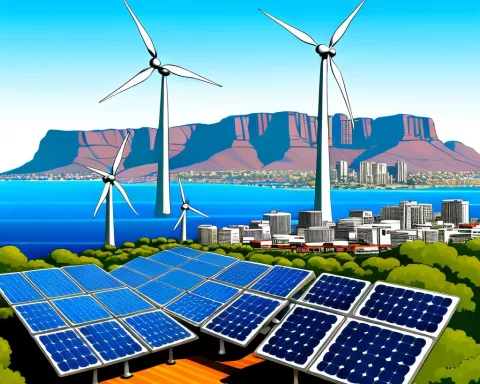The 2024/25 Budget Vote of National Treasury is a blueprint for financial stability and economic unity in South Africa. It aims to reduce the fiscal deficit and debt-service costs through stringent spending controls and revenue initiatives, while promoting fiscal sustainability, economic integration through infrastructure development, and sustainable development. The plan requires the united efforts and commitment of all stakeholders, including the government, private sector, and citizens, to achieve its goals.
What is the 2024/25 Budget Vote of National Treasury?
The 2024/25 Budget Vote of National Treasury is a fiscal strategy that aims to reduce the fiscal deficit to 3.4% of GDP by 2026/27 and limit the rise of debt-service costs relative to revenue through stringent spending controls, revenue initiatives, and measures to boost growth. The strategy advocates for fiscal sustainability, economic integration through infrastructure development, and sustainable development. It requires the united efforts and commitment of all stakeholders.
Section 1: Unveiling the Fiscal Strategy
At a revered gathering of esteemed representatives, Finance Minister Enoch Godongwana presented the fiscal strategy for 2024/25 by the National Treasury. The strategy represents the government’s dedication to the stability of public finance, a critical factor in maintaining top-tier public services and ensuring fairness between generations.
The strain on public finances has been constant since 2012, resulting in escalating fiscal deficits. The present financial year acknowledges an overwhelming debt of R5 trillion, generating projected debt-service costs expected to exceed R380 billion. This essentially redirects vital resources from providing services. The fiscal plan includes stringent spending controls, revenue initiatives, and measures to boost growth to counter this. The goal is to reduce the fiscal deficit to 3.4 per cent of GDP by 2026/27 and limit the rise of debt-service costs relative to revenue.
Section 2: Advocating for Fiscal Sustainability
To promote fiscal sustainability, the department is pushing for a secure fiscal framework and an equitable tax system. Achieving this entails a delicate equilibrium between declining tax revenue and increasing government expenditure priorities. The department’s intent is to propose tax measures that promote environmental sustainability, decrease disparity, and boost revenue in the upcoming years.
The department plans to aid the rebuilding and revenue collection enhancement of the South African Revenue Service with additional financial allocations. The department is also making efforts to enhance the economic fairness and efficiency of the tax system through proposed taxation legislation. Moreover, a plan of action is in motion to exit from the Financial Action Task Force (FATF) grey-list, with a target of success by early 2025.
Section 3: Economic Integration Through Infrastructure Development
Economic integration through infrastructure development and the establishment of economically integrated cities and communities are central to the macro-fiscal strategy. Regulations for Private-Public Partnerships have been revised and published by the National Treasury, which initiates the path for increased infrastructure investments. This will be achieved through policy and regulatory reforms in sectors such as energy, transport, and water. The objective is to quicken private sector involvement in these sectors using a systematic approach.
The department is also concentrating on augmenting the contributions of cities and metros to economic growth and tax revenue generation. This is realized through the execution of infrastructure and development support programs that act as catalysts and the management of conditional grants. The department’s initiatives include executing 35 catalyst projects in strategically targeted metropolitan cities, intermediate cities, and rural towns over the medium term.
Section 4: Commitment to Sustainable Development
In conjunction with the department’s dedication to sustainable development, the implementation of an indirect grant for smart meters will enhance efficiency and billing accuracy in local government. This grant is designed to safeguard existing revenue and maximize total revenue collection from municipalities. It also promotes the integration of renewable energy to meet the demands of consumers.
The budget for 2024/25 by the National Treasury, amounting to R3.3 trillion, targets enhancing fiscal sustainability via mechanisms like a credible tax system, support for sustainable employment, and facilitation of regional and international partnerships. Remarkably, 57.9 per cent (R1.9 trillion) is earmarked for transfers to provincial governments as part of the provincial equitable share.
In essence, the outlined strategies form part of the department’s current Strategic Plan for 2020–2025. The plan aims to ensure sustainable public finances, coherent economic strategy, and robust financial controls and management of public finances. The successful actualization of this strategy requires the united efforts and commitment of all stakeholders, including the President, Deputy President, Cabinet members, Deputy Ministers of Finance, and the personnel of the National Treasury.
-
What is the 2024/25 Budget Vote of National Treasury?
The 2024/25 Budget Vote of National Treasury is a fiscal strategy that aims to reduce the fiscal deficit to 3.4% of GDP by 2026/27 and limit the rise of debt-service costs relative to revenue through stringent spending controls, revenue initiatives, and measures to boost growth. The strategy advocates for fiscal sustainability, economic integration through infrastructure development, and sustainable development. It requires the united efforts and commitment of all stakeholders. -
What is the goal of the 2024/25 Budget Vote of National Treasury?
The goal of the 2024/25 Budget Vote of National Treasury is to reduce the fiscal deficit to 3.4 per cent of GDP by 2026/27, limit the rise of debt-service costs relative to revenue, and promote fiscal sustainability, economic integration through infrastructure development, and sustainable development. -
How does the National Treasury plan to achieve fiscal sustainability?
To achieve fiscal sustainability, the National Treasury plans to propose tax measures that promote environmental sustainability, decrease disparity, and boost revenue. The department also plans to aid the rebuilding and revenue collection enhancement of the South African Revenue Service with additional financial allocations. Moreover, a plan of action is in motion to exit from the Financial Action Task Force (FATF) grey-list, with a target of success by early 2025. -
How does the National Treasury plan to promote economic integration through infrastructure development?
To promote economic integration through infrastructure development, the National Treasury plans to quicken private sector involvement in sectors such as energy, transport, and water through policy and regulatory reforms. The department is also concentrating on augmenting the contributions of cities and metros to economic growth and tax revenue generation. This is realized through the execution of infrastructure and development support programs that act as catalysts and the management of conditional grants. -
How does the National Treasury plan to commit to sustainable development?
In conjunction with the department’s dedication to sustainable development, the National Treasury plans to implement an indirect grant for smart meters to enhance efficiency and billing accuracy in local government. This grant is designed to safeguard existing revenue and maximize total revenue collection from municipalities while promoting the integration of renewable energy to meet the demands of consumers. -
What is required to achieve the goals of the 2024/25 Budget Vote of National Treasury?
The successful actualization of the goals of the 2024/25 Budget Vote of National Treasury requires the united efforts and commitment of all stakeholders, including the government, private sector, and citizens. It also requires the dedication to sustainable public finances, coherent economic strategy, and robust financial controls and management of public finances.












